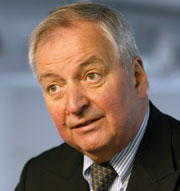NEWS FEATURE: Global economic engine depends on energy security
 Berlin - The global economic crisis was precipitated in part by "massive speculative fluctuations in international energy and commodity markets," former German environment minister Klaus Toepfer said Wednesday.
Berlin - The global economic crisis was precipitated in part by "massive speculative fluctuations in international energy and commodity markets," former German environment minister Klaus Toepfer said Wednesday.
Speaking at an energy forum in Berlin, Toepfer said: "We need to radically rethink the global mechanisms for our energy supply system to avoid suffocating the incipient, desperately needed economic upturn.
"There is," he emphasised, "no alternative to a fundamental realignment of our energy systems from an economic and ecological point of view."
"One can't simply preserve jobs for the sake of preserving jobs," he said. Creating employment opportunities into the future would require global environment leadership.
"Climate friendly production is the solution to the current crisis, not its cause," he emphasized.
Toepfer, who in the late 90s served as the executive director of the UN's environment programme UNEP in Nairobi, said that while economic stimulus packages were being implemented to stem the tide of unemployment and social dislocation, the global economic downturn was occurring "in the midst of a comprehensive crisis of ecological stability."
Global energy and technology experts, he said, were stepping up their activities to secure a role in future growth markets.
The focus of investment in renewable energy technology might, he felt, shift from "Europe to the United States and China in the not too distant future, with the emerging economic powerhouses of Brazil and India not far behind."
The negative economic impact of an unresolved reliance on fossil fuels was becoming increasingly clear, he said.
"The stronger the global demand for oil becomes as a result of an economic downturn in 2010 - above all in the United States, China and India - the sooner we may hit a bottleneck and experience a subsequent stifling of world economic growth."
The Paris-based International Energy Agency (IEA) has estimated the world needs to spend 26 trillion dollars in the modernisation of its energy of its infrastructure by 2030.
Hamburg-based Max Schoen, of the African Solar Energy Initiative DESERTEC, said by far the largest, technically accessible source of energy on the planet was to be found "in the deserts around the equatorial regions of the earth."
Proposals had been made which would involve Europe, the Middle East and North Africa (MENA) co-operating in the production of electricity and desalinated water using solar thermal power and wind turbines in the MENA deserts, he said.
Feasibility studies had been carried out by the German Aerospace Centre (DLR). "All that is needed now is the political will and the right framework of incentives," he added. (dpa)